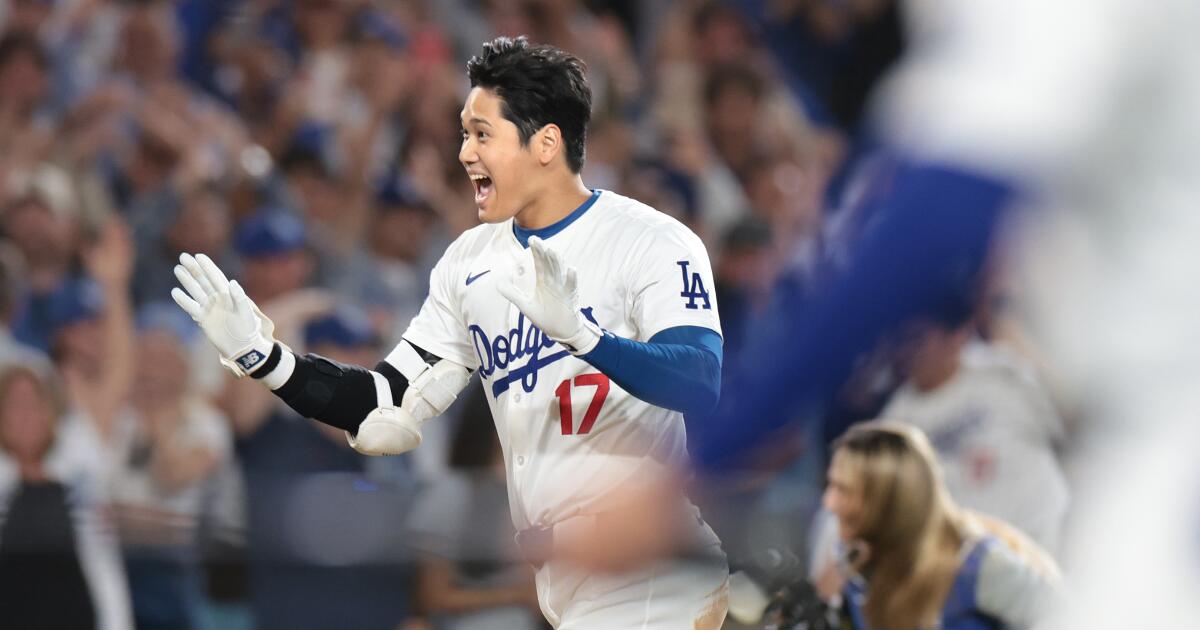Whenever he stepped into the batter’s box, the crowd at Dodger Stadium used to chant, “Cruuuuz!” He was a role player on the Dodgers for less than two seasons, but the team sold his replica jersey in the team store.
Luis Cruz was beloved by fans.
Over the weekend, it was the now-40-year-old Cruz who played the role of fan as he recounted the walk-off grand slam that made Shohei Ohtani the sixth player in baseball history to hit 40 home runs and steal 40 bases in a season.
A decade ago, one season after he was designated for assignment by the Dodgers, Cruz played for the Chiba Lotte Marines of Japan’s Pacific League. There, the Mexican infielder encountered a second-year, two-way player who was considered the country’s top prospect. The player was Ohtani, who was then a 19-year-old on the Nippon-Ham Fighters.
“I didn’t expect him to be this good as a hitter,” Cruz said in a phone interview.
Cruz certainly didn’t expect him to be the kind of hitter who could do what he did on Friday night to reach the 40-40 milestone.
In the bottom of the ninth inning of a 3-3 game, the Tampa Bay Rays brought in left-hander Colin Poche to face the left-handed-hitting Max Muncy with two outs and runners on second and third base.
Poche walked Muncy on five pitches to load the bases. Up next was Ohtani, who also bats left-handed. Cruz said if he was Ohtani, he would have looked for a fastball on the inside half of the plate and probably taken a pitch.
“I’m not going to step into the box thinking slider low and away,” Cruz said.
But that’s what Poche threw on the first pitch of the at-bat, and that’s what Ohtani sent over the right-field wall for his 40th home run of the season.
“For me, it was, like, how?” Cruz said as he laughed in disbelief.
Cruz, who remains an active player in Mexico’s winter league with his hometown Mayos de Navojoa, marveled at the confidence required to swing at such a pitch.
“If he hit a weak fly ball in the infield, he would’ve looked stupid,” Cruz said.
Ohtani said of his mindset in that at-bat: “I went in feeling that a single would be enough or even a walk.”
The teenage version of Ohtani whom Cruz first encountered was considerably lankier than the 30-year-old version of Ohtani who is on track to win his third most valuable player award, but Cruz said that even then, his batting practice was “incredible.”
“He hit it wherever he wanted,” Cruz said. “His bat was like a whip, sort of like Ichiro’s.”
Cruz played alongside Ichiro Suzuki for about a month, as he was picked up by the New York Yankees after he was let go by the Dodgers.
With a resume that also included stints with the Pittsburgh Pirates and Milwaukee Brewers, Cruz said he was often asked in Japan about how Ohtani might fare in the United States. He thought Ohtani’s major-league future was on the mound, figuring he would have to focus on either pitching or hitting.
“I always expected him to be a good pitcher,” he said. “He had three good pitches — fastball, splitter and slider — and he threw 100 [mph].”
Cruz was introduced to Ohtani by right-hander Luis Mendoza, who was on the Fighters and struck up a friendship with the aspiring two-way player. This led to Cruz jokingly saying to Ohtani whenever he was about to step into the batter’s box against him, “Massugu, massugu” — massugu is the Japanese word for straight, or fastball. Cruz recalled Ohtani politely bowing to signal that he wouldn’t oblige.
The tradition continued for a couple of years, as Cruz played two seasons with the Marines and a third with the Yomiuri Giants and Rakuten Golden Eagles.
Between innings of one particular game, Cruz said he heard someone calling out to him, “Cruz-san! Cruz-san!”
The voice was Ohtani’s.
Ohtani said to him with a laugh, “Today, you, no chance.”
By the time Cruz was playing for the Giants, Ohtani was the best pitcher in Japan.
“The first year, he was throwing,” Cruz said. “Now, he was pitching.”
He was also throwing harder. He threw a fastball to Cruz that season that was the fastest pitcher ever clocked in Nippon Professional Baseball up to that point, at 163 kilometers per hour, or about 101 mph.
Ohtani went on to finish the season with a 10-4 record and 1.86 earned-run average as a pitcher, and a .322 average with 22 home runs as a hitter. He won the Pacific League’s most valuable player award and the Fighters won the Japan Series.
Still, Cruz didn’t imagine Ohtani would dominate the major leagues to the degree that he has.
“It seems like the field is too small for him,” Cruz said. “It’s like he’s seeing the ball in slow motion.”
Pointing to how Ohtani threw his first bullpen session since undergoing his second Tommy John surgery last year, Cruz said, “He’s a machine.”
Cruz neglected to mention that Ohtani belted his 41st home run later in the day.
“Now that I see what he’s done, I’m, like, I played against this guy?” Cruz said.
His children were also skeptical. That changed earlier this year when Cruz was in San Diego for a youth baseball tournament with his 14-year-old son, Luis Jr. With his son by his side, Cruz dropped by Petco Park where the Dodgers were playing the San Diego Padres.
Hearing Cruz was around, Ohtani emerged from the clubhouse to catch up. Ohtani autographed a baseball for Luis Jr.
“He has it like a trophy in his room,” Cruz said.
In Cruz’s view, the reunion had one downside. His son, who is a promising shortstop, said to him after the meeting: “I want to pitch.”

